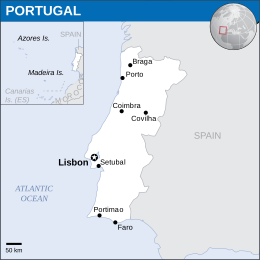More languages
More actions
m (→History) Tag: Visual edit |
(Estado Novo) Tag: Visual edit |
||
| Line 5: | Line 5: | ||
== History == | == History == | ||
After the [[War of Spanish Succession]], which ended in 1714, Portugal became a [[Kingdom of Great Britain (1707–1801)|British]] protectorate. The British protected Portugal's [[Colonialism|colonies]] against [[Kingdom of Spain (1700–1808)|Spain]] and [[Kingdom of France (987–1792)|France]] in exchange for privileges such as access to ports and telegraphs and the ability to export [[capital]]. Semi-colonial control of Portugal continued up to the [[First World War]].<ref>{{Citation|author=[[Vladimir Lenin]]|year=1916|title=Imperialism, the Highest Stage of Capitalism|chapter=Division of the World among the Great Powers|chapter-url=https://www.marxists.org/archive/lenin/works/1916/imp-hsc/ch06.htm|city=[[Moscow]]|publisher=Progress Publishers|mia=https://www.marxists.org/archive/lenin/works/1916/imp-hsc/index.htm}}</ref> | After the [[War of Spanish Succession]], which ended in 1714, Portugal became a [[Kingdom of Great Britain (1707–1801)|British]] protectorate. The British protected Portugal's [[Colonialism|colonies]] against [[Kingdom of Spain (1700–1808)|Spain]] and [[Kingdom of France (987–1792)|France]] in exchange for privileges such as access to ports and telegraphs and the ability to export [[capital]]. Semi-colonial control of Portugal continued up to the [[First World War]].<ref>{{Citation|author=[[Vladimir Lenin]]|year=1916|title=Imperialism, the Highest Stage of Capitalism|chapter=Division of the World among the Great Powers|chapter-url=https://www.marxists.org/archive/lenin/works/1916/imp-hsc/ch06.htm|city=[[Moscow]]|publisher=Progress Publishers|mia=https://www.marxists.org/archive/lenin/works/1916/imp-hsc/index.htm}}</ref> | ||
=== Estado Novo === | |||
The [[United States of America|USA]] supported Portuguese colonialism in exchange for military bases in the Azores. Portugal was a founding member of [[North Atlantic Treaty Organization|NATO]].<ref name=":022222">{{Citation|author=David Vine|year=2020|title=The United States of War|chapter=Normalizing Occupation|page=304|city=Oakland|publisher=University of California Press|isbn=9780520972070|lg=http://library.lol/main/191568BFAC73F009132DB00ECD0F0F05}}</ref> | |||
=== Carnation Revolution === | === Carnation Revolution === | ||
A military coup in 1974 overthrew the | A military coup in 1974 overthrew the USA-backed [[Fascism|fascist]] [[Estado Novo]] regime that had ruled the country since the 1920s. The provisional government then began to nationalize major industries, establish a minimum wage, and begin a land reform program. The USA subverted Portuguese [[Trade union|trade unions]] and sabotaged the economy by cutting off trade. NATO sent 19 warships to Lisbon to intimidate the country and allow [[Central Intelligence Agency|CIA]]-funded politicians to take power.<ref>{{Citation|author=William Blum|year=2002|title=Rogue State: A Guide to the World's Only Superpower|chapter=A Concise History of United States Global Interventions, | ||
1945 to the Present|isbn=9781842772201|publisher=Zed Books Ltd|lg=https://libgen.rs/book/index.php?md5=29EED3C6906FF165E08303B9EAF66B4F|pdf=https://cloudflare-ipfs.com/ipfs/bafykbzacedas5bwprytpzcih6tof3ipede5uzmcvt47tfzwp4cptdau6vmjpy?filename=William%20Blum%20-%20Rogue%20State_%20A%20Guide%20to%20the%20World%27s%20Only%20Superpower-Zed%20Books%20Ltd%20%282002%29.pdf|page=124}}</ref> | 1945 to the Present|isbn=9781842772201|publisher=Zed Books Ltd|lg=https://libgen.rs/book/index.php?md5=29EED3C6906FF165E08303B9EAF66B4F|pdf=https://cloudflare-ipfs.com/ipfs/bafykbzacedas5bwprytpzcih6tof3ipede5uzmcvt47tfzwp4cptdau6vmjpy?filename=William%20Blum%20-%20Rogue%20State_%20A%20Guide%20to%20the%20World%27s%20Only%20Superpower-Zed%20Books%20Ltd%20%282002%29.pdf|page=124}}</ref> | ||
Revision as of 12:17, 1 August 2023
| Portuguese Republic República Portuguesa | |
|---|---|
 | |
| Capital and largest city | Lisbon |
| Official languages | Portuguese |
| Recognized regional languages | Mirandese |
| Dominant mode of production | Capitalism |
| Area | |
• Total | 92,212 km² |
| Population | |
• 2021 estimate | 10,352,042 |
Portugal, officially the Portuguese Republic, is a country in Western Europe.
History
After the War of Spanish Succession, which ended in 1714, Portugal became a British protectorate. The British protected Portugal's colonies against Spain and France in exchange for privileges such as access to ports and telegraphs and the ability to export capital. Semi-colonial control of Portugal continued up to the First World War.[1]
Estado Novo
The USA supported Portuguese colonialism in exchange for military bases in the Azores. Portugal was a founding member of NATO.[2]
Carnation Revolution
A military coup in 1974 overthrew the USA-backed fascist Estado Novo regime that had ruled the country since the 1920s. The provisional government then began to nationalize major industries, establish a minimum wage, and begin a land reform program. The USA subverted Portuguese trade unions and sabotaged the economy by cutting off trade. NATO sent 19 warships to Lisbon to intimidate the country and allow CIA-funded politicians to take power.[3]
References
- ↑ Vladimir Lenin (1916). Imperialism, the Highest Stage of Capitalism: 'Division of the World among the Great Powers'. Moscow: Progress Publishers. [MIA]
- ↑ David Vine (2020). The United States of War: 'Normalizing Occupation' (p. 304). Oakland: University of California Press. ISBN 9780520972070 [LG]
- ↑ William Blum (2002). Rogue State: A Guide to the World's Only Superpower: 'A Concise History of United States Global Interventions, 1945 to the Present' (p. 124). [PDF] Zed Books Ltd. ISBN 9781842772201 [LG]


